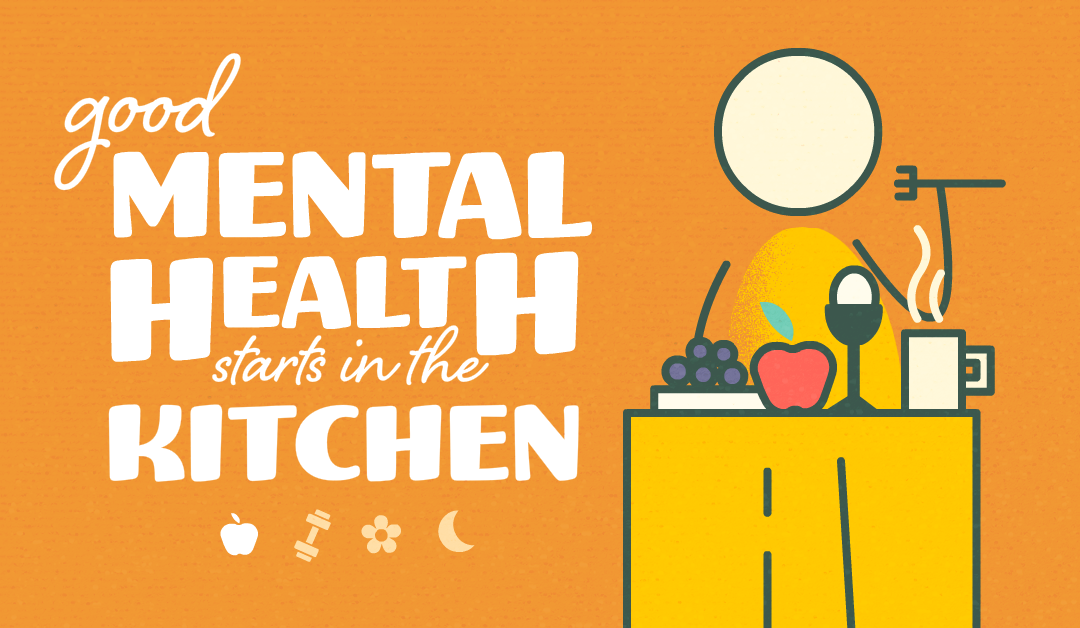Nutrition is the building block for really good mental health. The food we consume is what fuels our body, both physically and mentally. So, in order to reintegrate mindfulness into all aspects of our modern lives, remember that good mental health starts in the kitchen. But how does diet actually affect mental health?
Diet and health go hand-in-hand. With an estimated 11 million deaths per year being attributed to unhealthy diets, the time to take nutrition seriously in the healthcare ecosystem is yesterday. This blog will primarily focus on food as it pertains to mental health and wellness, but please keep in mind the holistic picture that paints the vitality of healthy nutrition habits.
Also, please note that none of the information shared here is to be considered a health treatment plan for you. Always consult your clinical team for the best practices for you. Use this information as a guideline for building healthy nutrition habits in your unique context.
Incorporating mindful habits into food choices can compound the treatment plans prescribed by doctors. Nutritional psychiatry is a growing subfield that provides a potentially powerful alternative to prescribing medication for treatment of anxiety and depression. There’s a lot that goes into the body’s use of good food, though, so buckle up.
Really, when thinking about diet and nutrition, usually only topics associated with weight gain/loss, allergies and intolerances, and cardiovascular health are considered. However, mounting evidence points to the exponential impact that food choices have on mental and emotional health, and it all starts with the body’s second brain… the gut!
Food for thought
The human body is so complex, y’all. And that makes it so cool! Leaning into the natural processes that our bodies instinctively do to maintain homeostasis is a huge way to boost mental (and physical) wellness. One key aspect of this balance is serotonin.
Serotonin is a neurotransmitter responsible for regulating appetite and sleep cycles, as well as temper moods and hinder inflammation and pain in the body. As surprising as it may be, the gut is responsible for supplying about 95% of the serotonin in the body.
Furthermore, about 50% of the dopamine in the body is produced in the gut. This neurotransmitter influences cognition, reward, satiety, pleasure, and motivation. “Gut feeling” takes on a whole new meaning, huh?
So it’s very safe to say that your gastrointestinal tract doesn’t just help you digest the food you eat, but it also guides your mental and emotional health. But the production and activation of these neurotransmitters in the gut actually relies on some very interesting little creatures that live inside everyone’s body: bacteria!
Good food mood
Don’t be alarmed; there are billions of “good” bacteria that populate your intestinal microbiome, and you need them! They line your intestines, ensuring a strong barrier against “bad” bacteria and toxins, as well as limit inflammation and boost your body’s ability to absorb the nutrients in the food you consume.
They also activate the neural pathways that connect the gut to the brain, which is why they can heavily alter your mood and energy level. Eating nutritionally dense food promotes the growth of these good bacteria and their production and efficiency of serotonin and dopamine in the body, which affects what you crave and influences feeling hungry or full.
Which came first: the craving or the egg?
Generally, less diversity and types of bacteria in the gut relates to hunger, while diverse microbiota teeming with good bacteria is associated with satiety. An aside, but see how diversity is exponentially beneficial to gut health (thus mental health) within the body? Diversity in our connections and surroundings is just as important!
Back to microscopic organisms and cravings, it’s worth knowing that different bacteria prefer different substances. For them to grow and reproduce (and boost your gut health and consequently mental health), they need a consistent flow of their particular nutrients.
So, when certain types of bacteria aren’t getting the nutrients they want, they can influence the neurotransmitters connecting your gut to your brain and cause you to feel hungry or crave certain things. Sugar is a big culprit here.
To limit those negatively influencing bacteria, it’s best to prioritize helping the good bacteria grow and develop. So, eating healthy and nutritious food creates a very natural cycle that promotes good bacteria, causing cravings for those same nutritious foods, which all leads to growth and development of more of those beneficial bacteria, and finally those boosts in your mood and mental health happen.
The opposite is true, as well. Taking note of how different types of foods negatively affect your body, behaviors, and emotions is a great way to incorporate mindfulness into nutrition. Eat healthy for those good bacteria!
Comfort food vs. invigorating food
At Simply Psych, we always recommend to follow the health and nutrition advice of your doctor. One healthy trick to remember is to prioritize invigorating food over comfort food. Oftentimes, when we are feeling depressed or anxious, one of our first responses is to reach for comfort food to help us feel better.
But in reality, typical comfort foods like fried food, chips, ice cream, etc. are full of all the wrong nutrients that our body and all those gut bacteria are desperately crying out for. Junk food actually increases levels of anxiety and depression. So, instead of reaching for pizza and ice cream next time you’re feeling down, try going for some fruits and veggies to help your body regulate your serotonin levels.
It may feel counterintuitive, but in reality it’s just practical biology. So next time you’re feeling hangry, blame it on science! Just remember to regularly fuel your body with healthy nutrients.
As mentioned, sugar and processed foods can cause inflammation throughout the body and brain, contributing to mood disorders like anxiety and depression. Remember, thanks to the power of your gut, a poor diet during periods of stress and depression only makes matters worse. This cycle is a vicious one, but it can be overcome.
To boost your mental health, focus on eating plenty of fruits and vegetables along with foods rich in omega-3 fatty acids, such as salmon. Dark green leafy vegetables in particular are brain protective. Nuts, seeds and legumes, such as beans and lentils, are also excellent brain foods. And don’t forget about caffeine!
Caffeine and mental health
While classified as a drug (in this case, a stimulant), caffeine can certainly affect your mood and mental wellbeing each day. It is important, though, to keep in mind the notion of moderation. Over-consuming caffeine can cause negative side effects like insomnia and anxiety, but let’s discuss its benefits.
Countless studies have shown that caffeine, which acts as a stimulating agent for the central nervous system, enhances performance and decreases tension, especially when consumed in the morning. It has even been found to lessen fatigue and increase alertness.
Caffeine consumption in varying doses at different times throughout the day can significantly alter mood, and habitual coffee drinkers reportedly have a decreased risk of depression. So, if you want to improve your mood, sometimes all it takes is a simple trip to meet a friend over a cup of tea or coffee.
Practical tips for making mindful choices on what to eat
Don’t forget that context is everything in mental health. That means there really is no “one-size-fits-all” approach when it comes to what you should/shouldn’t eat. What works for your colleague that you meet for lunch once a month may not work for your body, and vice versa.
While there are many general rules of thumb for what nutritionists typically recommend as good-for-your-mood choices (of which we highlight a few below), the same thing will not work for everyone. Always consult your healthcare team before making any major changes to your diet and lifestyle.
- Feeling down? The best meal to enhance your mood is one that combines complex carbohydrates (e.g., sweet potatoes, rolled oats, beans, and quinoa) with lean proteins (e.g., fish, poultry, tofu, beans, eggs, and unsweetened yogurt) and colorful produce (e.g., beets, carrots, kale, blueberries, citrus fruits, etc.).
- Consider following a Mediterranean diet consisting of fruits and vegetables, fatty fish, leafy greens, legumes and nuts, and plenty of whole grains to decrease symptoms of depression.
- Some of the worst foods to consume for your mental health are flour-based foods like bread and baked goods, as well as sugar-sweetened beverages and snacks like soda and candy. While there certainly is room to treat yourself and enjoy these types of foods, moderation is key. If you ate four pieces of candy one day, try to only eat two or three the next, and so on to naturally limit your intake and cravings.
- Health-permitting, try removing certain foods from your diet completely for a week or two and take note of how your body feels differently. Then, as you reintroduce them back into your meal plan, be aware of the effects of those particular foods.
- Snacking between meals is a great way to hit nutrition goals, but oftentimes traditionally snacky foods are not good for you. Prioritize less-processed, non-GMO, natural snacks like plantain chips, date and nut bars, and edamame.
- Buy fresh fruits and vegetables and leave them out in bowls in your kitchen. The more you see it, the more likely you are to eat it, especially when in a snacky mood.
- For caffeine consumers, try to consume your coffee or tea within preferred windows of your day. Most experts recommend waiting at least an hour after waking up before drinking caffeine, and having your last bit of caffeine at least eight hours before you go to bed.
- Hydration is key! Our bodies need water to function, and staying hydrated will do wonders for your body and mental health. Water intake is individualized, but generally four- to six-cups a day is ideal.
- Remember, you don’t have to completely alter your diet overnight. Consult your trusted medical team and make gradual changes so you don’t disrupt your gut bacteria and cause cravings for unhealthy foods.
- Be patient with yourself. The mood changes and positive mental health benefits we discussed will take time to be fully realized. Stay consistent, and you’ll feel better.
To fully reintegrate mindfulness into our daily lives, we must take the time to consider how our body is fueled and equipped to maintain and regulate our mood and emotions. Simply Psych is committed to promoting inclusive and practical mindfulness so that all people can feel better together. Learn more at www.simplypsych.com today!


Recent Comments